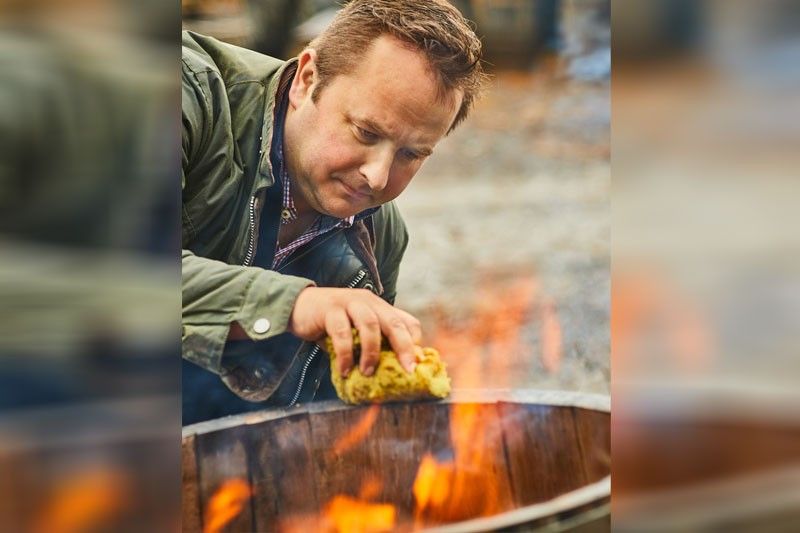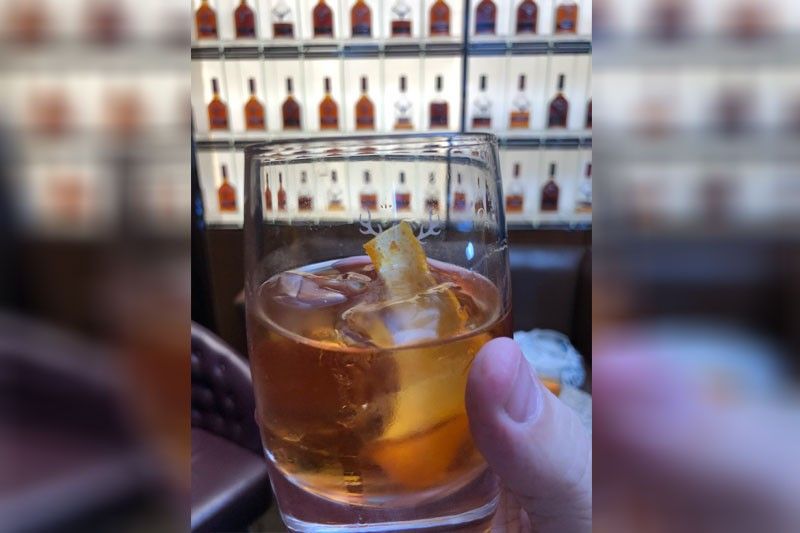Gregg Glass is the artist behind whisky masterpieces

If The Dalmore were a TV series, it might first focus on the grand painting located near the entrance of The National Gallery in Edinburgh: it’s a massive 14x17-foot canvas known as “The Fury of the Stag” by American artist Benjamin West, dated 1786. Here, the intrepid Colin of Kintail stopped King Alexander III from being stomped by a rearing stag by thrusting a sword at the penultimate moment — and for this Colin was richly rewarded, including the coveted Mackenzie clan crest that directly led to the creation of a luxury whisky brand that has lasted over 180 years (that same stag crest still adorns each bottle).
The Dalmore is about history, and the painting we see in the background behind Master Distiller Gregg Glass and Kieran Healey-Ryder, head of Whisky Discovery at Whyte and MacKay, as they guide us (via linkup) through a tasting session back here in Manila — tells part of a story that requires many chapters to unfurl.
Today, it starts with a rare tasting of three editions of The Dalmore, as George Schultz, Asia’s Resident Whisky Expert of the brand, is here at its swanky BGC flagship store to explain the “rule of threes” when approaching a 12-, 15- or 21-year luxury single malt whisky: tapping the glencairn glass to your nose thrice, each sniff enhancing the olfactory complexity, leading to that first sip, thoughtfully washed across the palate for at least 10 seconds, to bask in its emerging flavors, before welcoming it down the gullet.
As Glass tells us of his adventures working beside Richard Paterson, OBE, considered the greatest whisky maker of his generation, it becomes clear that a key ingredient to reaching what they describe as “The Dalmore Experience” is not only incorporating the clean, pure waters surrounding Alnes, the small Scottish town where the whiskey maker set up almost two centuries ago; nor harvesting the lush meadows to provide golden barley for malting; no, Glass notes that a more subtle ingredient behind the experience is “time.”
“Luxury is about dedication to excellence at every level, and a big part of luxury is time,” he says. “Luxury today is about experience and enjoying a whiskey over time.”

Because of The Dalmore cask curation process, every step undertaken by Glass and Paterson — from quality control at the production level, to the selection of American oak and Spanish sherry casks, to the years stored in each cask — has to be studied, refined and enhanced. “We're often referred to as Master Distillers, but also we’re master blenders,” says Glass. “Functionally, we have to go back to all the different practices of sourcing that cast, even sourcing the trees, right back to the forest, right through the process. So we're actually nurturing what we're seeing — all the different dynamics of time.”
Glass was awarded the coveted title of Master Distiller of 2023 at the Icons of Whisky Scotland Awards. I ask if this title requires more of him as a caretaker, or as an innovator, for the legacy brand.
“It's quite difficult to estimate how much time I spend on the continuity of the quality versus the experimentation,” he says. “I often talk about it a little bit like balancing science and art — not just focusing on one aspect. I would say that both Richard and I are end-to-end whiskey makers. I mean we're going all the way back to our barley sourcing, our spirit production; also how the consumer is going to enjoy what we've created with each of these masterpieces.”
From the 12 Year edition, we sample the 15 Year — a best seller in Asia, Schultz believes, “because of the finishes. It has that core Dalmore DNA: caramelized orange and dark chocolate. Very much indicative of that house style.”
Glass adds, “We're using three different styles of 30-year-old sherry casks here — Apostoles, Amoroso and Matusalem oloroso — with two to three years of a finishing period. So starting out in American white oak and then having that enhancement in different styles of sherry. Each of the sherries is important; we don't want to dominate the character of Dalmore, it's really about harmony and balance.”
He adds the 15 Year “has a soft brightness to it, a freshness, some floral qualities that are coming through; crushed apples is a key characteristic; also key citrus notes, marmalade qualities coming through, as well as subtle blood orange characteristics, put through the Apostoles casks.”
We move to the 18 Year, and it’s even more expressive: “Many 18-year whiskies sort of get to a point where they're quite rounded,” says Glass, “but there's two or three key notes with our 18-year-old that you could spend all day looking at that take on different nuances and elements, and these characteristics have been purposely built by Richard and I into each individual bottle.”

Time is key to creating an experience of luxury. “The Fury of the Stag” begins with a dramatic moment; the series, if you will, continues to unfold, develop over the centuries, each cask announcing new developments, new characters and expressions.
Taking time to appreciate luxury is why we’re here today. It’s easy to point to the amazing Dalmore showroom at Uptown Bonifacio — in which, yes, there is a Constellation Collection of the country’s most expensive single malt whiskies, with a prized 50 Year Old edition, one of only 50 bottles in the world, selling for a staggering P7 million; and next door is a luxe lounge where many of Manila’s finance titans and top CEOs stop by to uncork their private bottles, shown on display in a glass case bearing their names, perhaps to enjoy along with a nice Montecristo. One could point to all of that as a visible sign of “luxury.” But Glass is speaking of something more ineffable.
I ask him to recall a “transcendent” moment working alongside “The Nose,” as Paterson is known, and he mentions a tradition shared with his mentor: traveling to Jerez de la Frontera to select casks and sipping Tio Pepe sherry in the Spanish sun. “Some of our most favorite times are when we travel together to Jerez. The first thing we do when we arrive — after flying through so many airports — is sit down with a nice glass of Tio Pepe, in the Andalusian sun, and discuss what we're going to do next for our business.”
It shows, in a sense, that luxury is a state of mind for these Master Distillers



















